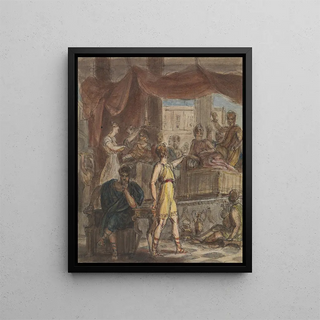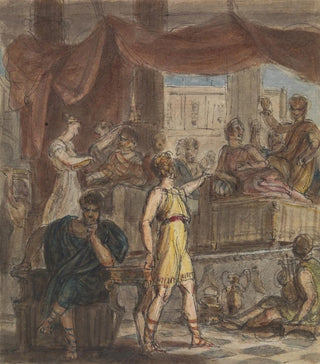Art print | Study of a Roman banquet scene - Robert Smirke


View from behind

Frame (optional)
In the vibrant universe of art history, certain works stand out for their ability to capture moments of human life with such intensity that they seem to transcend time. The art print Étude d'une scène de banquet romain - Robert Smirke is a perfect example. This piece immerses us in the lively atmosphere of a Roman banquet, evoking the richness of social interactions and rituals of the era. Through Smirke's gaze, the viewer is invited to explore the subtleties of human relationships, all within a setting where splendor and conviviality blend harmoniously.
Style and uniqueness of the work
Robert Smirke's work is characterized by meticulous attention to detail and a carefully orchestrated composition. In this study, the human figures are depicted with precision that reflects a deep understanding of anatomy and postures. The draped clothing of the guests, the play of light on the surfaces of dishes and cups, as well as facial expressions, reveal Smirke's mastery in the art of visual storytelling. The color palette, both rich and subtle, helps create a warm, almost tangible atmosphere that transports the viewer to the heart of this Roman celebration. Every element of the scene seems to have been chosen with care to enrich the narrative, making this work a true invitation to escape.
The artist and his influence
Robert Smirke, a British artist of the early 19th century, is often recognized for his ability to marry classical erudition with a nascent romantic style. His training and travels across Europe nourished his inspiration, allowing him to incorporate elements of mythology and history into his works. Smirke captured the essence of ancient traditions while reinterpreting them through the lens of his time. This approach allowed him to stand out in the artistic landscape of his era, influencing many contemporary and later artists. His depiction of historical scenes, such as the Roman banquet, reflects a profound reflection on human nature and social dynamics, offering an timeless perspective that continues to resonate today.

Matte finish

View from behind

Frame (optional)
In the vibrant universe of art history, certain works stand out for their ability to capture moments of human life with such intensity that they seem to transcend time. The art print Étude d'une scène de banquet romain - Robert Smirke is a perfect example. This piece immerses us in the lively atmosphere of a Roman banquet, evoking the richness of social interactions and rituals of the era. Through Smirke's gaze, the viewer is invited to explore the subtleties of human relationships, all within a setting where splendor and conviviality blend harmoniously.
Style and uniqueness of the work
Robert Smirke's work is characterized by meticulous attention to detail and a carefully orchestrated composition. In this study, the human figures are depicted with precision that reflects a deep understanding of anatomy and postures. The draped clothing of the guests, the play of light on the surfaces of dishes and cups, as well as facial expressions, reveal Smirke's mastery in the art of visual storytelling. The color palette, both rich and subtle, helps create a warm, almost tangible atmosphere that transports the viewer to the heart of this Roman celebration. Every element of the scene seems to have been chosen with care to enrich the narrative, making this work a true invitation to escape.
The artist and his influence
Robert Smirke, a British artist of the early 19th century, is often recognized for his ability to marry classical erudition with a nascent romantic style. His training and travels across Europe nourished his inspiration, allowing him to incorporate elements of mythology and history into his works. Smirke captured the essence of ancient traditions while reinterpreting them through the lens of his time. This approach allowed him to stand out in the artistic landscape of his era, influencing many contemporary and later artists. His depiction of historical scenes, such as the Roman banquet, reflects a profound reflection on human nature and social dynamics, offering an timeless perspective that continues to resonate today.






